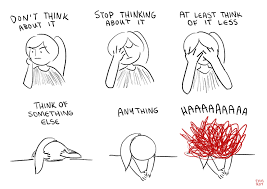Do you ever have thoughts that make you feel uncomfortable like maybe you shouldn’t be thinking them at all? Incidentally, you’ve experienced intrusive thoughts. Intrusive thoughts are conflicting causing the type of OCD symptom that can cause a lot of uneasiness and agitation. In this blog post, we will discuss what intrusive thoughts are, how they add to your OCD, and whether or not they are the inception of OCD.
They are defined as “unwanted, intrusive thoughts, images, or impulses that trigger intensely distressing feelings.” OCD sufferers often have intrusive thoughts about things like harm coming to themselves or others, sexual acts, or religious taboos. These thoughts can be very upsetting because they are usually accompanied by intense anxiety and fear.
Thus, intrusive thoughts can cause a lot of suffering because they are often accompanied by more apprehension. If you have OCD, intrusive thoughts may add to your anxiety and make your OCD worse. Specifically, intrusive thoughts are not the inception of OCD, but they can be a very noticeable symptom of OCD. There are many different types of intrusive thoughts. Hence, such thoughts make the mind more worrisome. Subsequently, it becomes more reactive leading to more intrusive thoughts and OCD.
Contents
What are Intrusive thoughts?
 Intrusive thoughts are unwanted, obtrusive thoughts, images, or impulses that trigger intensely disturbing feelings.
Intrusive thoughts are unwanted, obtrusive thoughts, images, or impulses that trigger intensely disturbing feelings.
Intrusive thoughts are often your nightmares and inability. They’re usually accompanied by intense anxiety and fear. If you have OCD, intrusive thoughts may add to your anxiety and make your OCD worse.
Intrusive thoughts originate from nightmares and the body’s inability to perform certain tasks. Intrusive thoughts merge with your insecurities making the situation worse which makes OCD more visible, and the situation out of control. Consequently, such thoughts are more disruptive making OCD worse.
How do these thoughts add to your OCD?
 If you have OCD, intrusive thoughts may add to your anxiety and make your OCD worse. Intrusive thoughts are not necessarily the inception of OCD. But they can be a symptom of OCD. There are many different types of intrusive thoughts.
If you have OCD, intrusive thoughts may add to your anxiety and make your OCD worse. Intrusive thoughts are not necessarily the inception of OCD. But they can be a symptom of OCD. There are many different types of intrusive thoughts.
Intrusive thoughts can be a symptom of OCD. They can increase the OCD behavior manifold. If you’re already suffering from OCD, intrusive thoughts may add to your anxiety and make your OCD worse. There are many different types of intrusive thoughts stirring your emotions. They disturb your mind to be more restless. Therefore. they exhibit behavior portraying more OCD.
Are Intrusive thoughts the inception?
 Intrusive thoughts are not the beginning of your OCD, however; they can be a part of your symptoms. Many people who have OCD experience different types of demeaning thoughts. These might include:
Intrusive thoughts are not the beginning of your OCD, however; they can be a part of your symptoms. Many people who have OCD experience different types of demeaning thoughts. These might include:
- Harm coming to oneself or others
- Sexual acts
- Religious taboos
Hence, intrusive thoughts can be very upsetting because they are usually accompanied by intense anxiety and fear. If you have OCD, such thoughts, may add to your anxiety and hence make your OCD worse.
Tips for dealing with them!
 There are many different ways that people have found helpful in dealing with intrusive thoughts. Some people find that keeping a journal helps to track their thoughts and see patterns. Others find it helpful to talk to a therapist about their thoughts. Thereafter, cognitive-behavioral therapy (CBT) is a type of therapy that can be particularly helpful. Thus, dealing with intrusive thoughts can be overwhelming. CBT can help you to learn how to manage your thoughts and reduce the anxiety that they cause.
There are many different ways that people have found helpful in dealing with intrusive thoughts. Some people find that keeping a journal helps to track their thoughts and see patterns. Others find it helpful to talk to a therapist about their thoughts. Thereafter, cognitive-behavioral therapy (CBT) is a type of therapy that can be particularly helpful. Thus, dealing with intrusive thoughts can be overwhelming. CBT can help you to learn how to manage your thoughts and reduce the anxiety that they cause.
If you are struggling with intrusive thoughts, there are many resources available to help you. You don’t have to suffer alone. Talk to your doctor or mental health professional about what you’re experiencing. There is help available, and you can get better. Don’t suffer in silence and alone.
Conclusion
 Disparaging and critical thoughts are a symptom of OCD. They can be very upsetting and cause a lot of suffering. If you have OCD, belittling thoughts may add to your anxiety and make your OCD worse. Moreover, there are many different types of intrusive thoughts, but there is help available. Remember, do not suffer in silence, talk to your doctor or mental health professional
Disparaging and critical thoughts are a symptom of OCD. They can be very upsetting and cause a lot of suffering. If you have OCD, belittling thoughts may add to your anxiety and make your OCD worse. Moreover, there are many different types of intrusive thoughts, but there is help available. Remember, do not suffer in silence, talk to your doctor or mental health professional
Consequently, creating awareness about the same is important. It is about ending the stigma!
If you have any queries regarding Online OCD Counseling experienced therapists at MantraCare can help: Book a trial OCD therapy session


